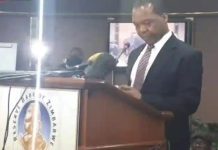GOVERNMENT’s move to abolish the multi-currency regime two weeks ago was aimed at undercutting possible social upheaval, Foreign Affairs Minister Sibusiso Moyo said last week.
Moyo was addressing British think-tank Chatham House on Friday and told his audience that poor Zimbabweans needed to endure the pain in order for the country to move out of the woods.
“In the past 2-3 years, the multi-currency system had shown that it was untenable. There was a thriving parallel market for currencies. The consequent surge in inflation had pushed prices into what I would call dangerous territory,” Moyo said.
With the situation threatening to explode, government moved quickly and banned the use of all major currencies for domestic transactions bringing to an end a decade old policy.
The move came at a time when most public servants were beginning to demand salaries in foreign currency and the US$ in particular amid reports the security services had become even more restive creating a politically dangerous concoction.
While admitting that Zimbabweans were going through a tough time, the Foreign Affairs Minister said this was necessary.
“Results of government’s austerity for posterity is beginning to bear fruit. There is reduced government expenditure.
“Government is now leaving within its means. Economic reforms will inevitably produce pain and increased hardships for the vulnerable and poor. Some say economic reform without pain,” said Moyo.
Since the announcement of the reforms, the most vulnerable groups in Zimbabwe have suffered untold hardships with prices of basic commodities shooting through the roof while incomes have been eroded by rampant inflation.
Critics have accused President Emmerson Mnangagwa and his senior officials of living large while demanding a tightening of belts among the poor.
Mnangagwa currently travels using a private jet hired from the Middle East that government claims was offered to the Zanu PF leader free of charge by the United Arab Emirates’ oil rich rulers.
Moyo added: “Reforms are a process which is painful. These reforms will affect the poor and move people out of their comfort zones.”






